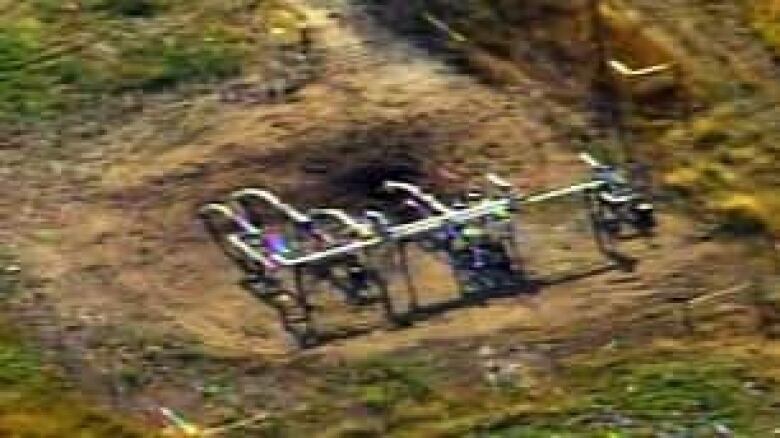More sabotage feared after 2nd pipeline bombed in northern B.C.

Canada's pipeline industry was on high alert Thursday after two acts of sabotage in less than a week targeted EnCana sour-gas pipelines about 50 kilometres southeast of Dawson Creek, B.C., near the Alberta border.
The latest case, discovered by pipeline workers around 9 a.m. MT Thursday morning, appeared linked to an explosion on the weekend and a threatening letter sent to local media last week, RCMP said.
In both incidents, explosives were used. No one was injured in either blast, but they raised fears that more could be coming.
"We believe someone or a group of people have set two deliberate explosions that were intended to rupture and blow up a natural-gas pipeline," RCMP spokesman Sgt. Tim Shields said Thursday.

"We are taking it very seriously, and now the RCMP's integrated national security enforcement team is taking the lead on this investigation."
Calgary-based EnCana said the second blast, which occured sometime overnight Wednesday, caused a minor gas leak, forcing the company to briefly shut down the pipeline.
"The leak was very small. It was contained or stopped almost immediately. In fact, when the line was depressurized, the leak stopped," spokesman Alan Boras said.
"People are very concerned, and [we] are taking this very seriously. We want to assure the public we are doing everything we can to ensure their safety."
<a href="http://www.cbc.ca/news/yourvoice/"><img src="http://www.cbc.ca/news/yourvoice/img/yourvoice-sidebar-header.jpg"></a><br>[/CUSTOM]
‘I believe it's time for our government to get serious about this issue that has been causing strife for Canadians for years. Tough zoning regulations are desperately needed before we have a major problem on our hands.’
--Alan Harris
<a href=http://www.cbc.ca/canada/british-columbia/story/2008/10/16/bc-second-pipeline-explosion-dawson-creek.html#articlecomments#postc>Add your comment</a>[/CUSTOM]
Pipeline workers in the area are being warned to be extremely vigilant. Sour gas is a form of natural gas that contains hydrogen sulphide, a toxic substance that is removed through a treatment process at gas plants.
Brenda Kenny, president of the Canadian Energy Pipeline Association, said significant security measures are in place to protect the country's pipelines, which she said are still the safest way to transport oil and gas.
"I can assure you that all people at this point are on high alert in light of these two acts," Kenny told CBC News on Thursday.

"I just want to restate [that] this is one or two individuals undertaking some criminal action for whatever means. We are not sure, but I am confident they will be brought to justice."
Shields said police believe the latest explosion is linked to a similar blast on the weekend that damaged but did not rupture a sour-gas pipeline about 20 km away.
That explosion, which occurred sometime overnight Saturday, didn't break the steel gas line, which has a diameter of about 30 centimetres, but did create a 1.8-metre crater in the ground.
Not acts of terrorism: RCMP
Investigators are treating the explosions as acts of vandalism, not terrorism, Shields said.
"Under the Criminal Code, it would be characterized as mischief, which is an intentional vandalism. We don't want to characterize this as terrorism. They were very isolated locations and there would seem there was no intent to hurt people," he said.
But David Harris, a security consultant and former strategist with the Canadian Security Intelligence Service, told CBC News the second explosion shows it's time to start looking at a political motive and to do more to protect Canada's critical infrastructure.
Last week, a handwritten letter arrived at a newspaper in Dawson Creek calling EnCana and other energy companies "terrorists" for expanding "deadly" gas wells. The letter gave the firms a deadline to shut down operations.
Dan Przybylski, the publisher of Dawson Creek Daily News, which received the letter, said many people in the community have expressed concerns about the oil and gas activity in the area and many people living near the pipelines are nervous about their safety.
"There is getting to be growing frustration and growing concern among the agricultural community about the number of pipelines that are criss-crossing the area, the ability that the oil and gas companies have ... accessing their property, the kinds of claims or compensation that the farmers and ranchers are getting," Przybylski said.
"What has been disturbing for us in the area is the growing level of protest. Rather than just having a couple of people standing up at the consultation process, the groups are getting bigger, and as well, the groups tend to be following the consultation process around the province."